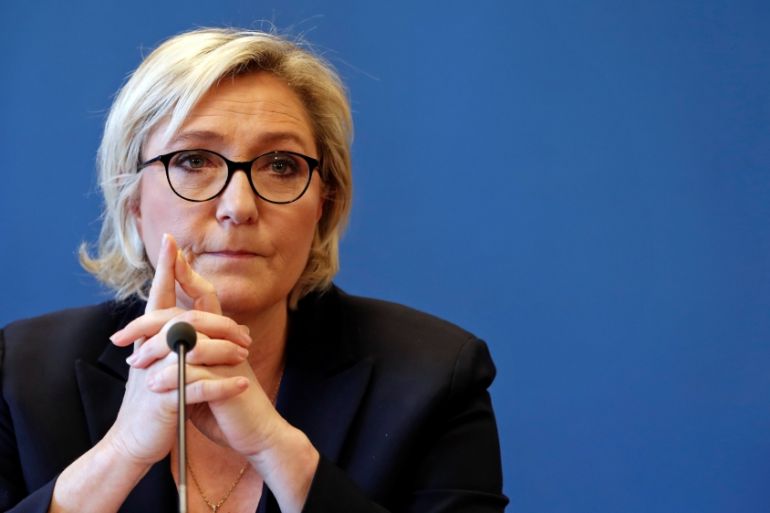Europe’s far-right leaders to meet in Prague
Marine Le Pen and Geert Wilders to feature in Prague meeting likely to face protests as Czech rightwing gains strength.

In a sign of growing unity among Europe’s far-right leaders, Marine Le Pen of France and Geert Wilders of the Netherlands are among several controversial figures due to meet in Prague for the start of a two-day conference to discuss their regional ambitions.
Several European parliament members (MEPs) in the Europe of Nations and Freedom coalition, who rode to power in recent years on the back of growing populism and xenophobia, are expected to be met on Saturday at the venue by hundreds of protesters.
Keep reading
list of 4 itemsGermany bans far-right Austrian nationalist Martin Sellner from entry
Australian efforts on Islamophobia flag despite Christchurch wake-up call
Norway court says mass killer Breivik’s prison isolation not ‘inhumane’
The conference has been organised by Czech-Japanese entrepreneur Tomio Okamura, whose anti-Islam Freedom and Direct Democracy Party (SPD) made unprecedented gains in the Czech legislative elections in October with nearly 11 percent of the vote, good enough to become the third largest party in the Chamber of Deputies.
In addition to members of Le Pen‘s National Front and Wilders’ Party for Freedom, Marcus Pretzell, a German MEP formerly with Alternative for Germany (AfD), is expected to attend the conference along with Janice Atkinson, an independent MEP who was expelled from Britain’s populist UKIP party two years ago amid her alleged involvement in a financial scandal. Atkinson was later cleared but one of her assistants subsequently pleaded guilty to fraud.
“Okamura has had contact with Le Pen for several years. This is not the first time they have met, so they are using the conference to build an internal rightwing in Europe and are building contacts with extremists,” said Jan Culik, a lecturer in Czech studies at the University of Glasgow.
![Czech-Japanese entrepreneur Tomio Okamura organised the forum [Milan Kammermayer/Reuters]](/wp-content/uploads/2017/12/1b0b34d3a3424a55abc88b337e9d3b26_18.jpeg)
With no other discernible policy, Okamura ran his campaign on the slogan “No to Islam, no to terrorism” and has called for an outright ban of the religion in the Czech Republic.
This weekend’s conference, at the Top Hotel outside central Prague, remains just as ambiguous, with no clear agenda yet published.
The conference comes as Andrej Babis, who took office as prime minister earlier this week, is the midst of trying to gain influence in a parliament where his ANO party currently holds just 78 seats in the 200-seat lower house and does not have enough support among the other eight parties to form a majority.
Babis is the second richest person in the Czech Republic and has continually railed against the EU‘s refugee quotas, even after the European Commission said this month that it would take his country to court over their refusal to take in asylum seekers.
“The [European] Commission can withdraw the charge at any moment. We have to negotiate on this and to offer different models, like guarding the borders or help to other countries. But we don’t want any refugees,” Babis said in an interview published earlier this month by Czech daily newspaper Pravo.
With little other support to be found, Babis has shown a willingness to work with Okamura’s SPD party and the far-left Communists on a quid pro quo basis by giving them committee posts in return for early votes.
Further adding to Okamura’s political clout, Czech President Milos Zeman raised eyebrows last week by delivering a speech in front of the SPD’s national congress.
“He [President Zeman] is deep in the worst moral dirt,” Jiri Dienstbier, a former human rights minister, said on Twitter at the time.
Growing influence
For 31-year-old activist Jan Cemper, one of the organisers of Saturday’s demonstrations, it is more important than ever that Czechs resist the growing influence of the SPD party, while also showing the world that not all Europeans agree with the increasingly present far-right values.
“We want to alert people that in the Czech Republic there is an increasing number of attacks against minorities due to policies executed by the SPD party,” Cemper told Al Jazeera.
“At the same time, we want to show, that such congresses of xenophobes and populists are not welcome here. We have to try to refute various manipulative claims of populists and show that the EU has not only negatives but many positives.”